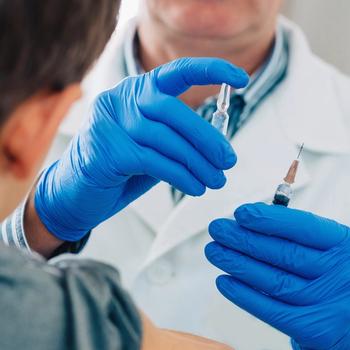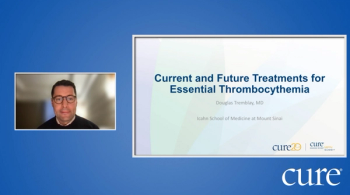
As more news is released about studies assessing cancer vaccines, one expert explains what this may mean for patients in the future.

Darlene Dobkowski, Managing Editor for CURE® magazine, has been with the team since October 2020 and has covered health care in other specialties before joining MJH Life Sciences. She graduated from Emerson College with a Master’s degree in print and multimedia journalism. In her free time, she enjoys buying stuff she doesn’t need from flea markets, taking her dog everywhere and scoffing at decaf.

As more news is released about studies assessing cancer vaccines, one expert explains what this may mean for patients in the future.

Although patients with cancer may feel both grateful and grief towards their bodies, one expert emphasizes how important seeking support from a professional can be throughout this process.

The FDA recently approved a combination treatment for patients with previously treated metastatic colorectal cancer with HER2-positive disease determined by biomarker testing.

Skin cancer can also occur in the nail area and may be associated with HPV, it may not be as common for it to result from a cut experienced during a manicure, one expert explained.

Patients undergoing surgery for gynecologic cancer may benefit from acupressure, acupuncture and other relaxation techniques regarding pain relief and a reduction in anxiety.

An oncolytic virus engineered to kill cancer cells was administered to a patient with pancreatic ductal adenocarcinoma as part of a phase 2b trial.

Patients with operable non-small cell lung cancer who were treated with an anti-PD-1 monoclonal antibody plus a doublet chemotherapy regiment did not experience cancer recurrence or new symptom onset during follow-up in a recent study.

Women who were taking beta-blockers, a medicine to treat heart conditions like high blood pressure, among others, near the time of surgery for epithelial ovarian cancer may confer a survival benefit years after undergoing a procedure.

As young adults, survivors of childhood cancers were more likely to report feeling lonely compared with their siblings, emphasizing the importance of screening.

The injection Lumoxiti, which was approved for patients with relapsed or refractory hairy cell leukemia, will be pulled from the U.S. market later this year, although alternative therapies are available.

Testicular cancer survivors who were treated with cisplatin-based chemotherapy may have hearing loss or ringing of the ears, which may significantly affect certain parts of life including sleep and concentration, among other factors.

The risk for psychiatric disorders increased for spouses of patients with cancer compared with those whose partners did not have cancer.

One patient describes the management of symptoms of graft-versus-host disease as playing Whac-a-Mole and emphasizes the importance of awareness and education for both patients and their families.

From prostate cancer to disease spread in the brain, one patient learned how to recognize how far he has come since his journey began.

One expert explains how the road to cancer drug development isn’t a smooth one, but progress can be made nonetheless.

FDA-approved immunotherapies offer patients with metastatic or recurrent sarcomatoid RCC more treatment choices and improved outcomes.

Patients with relapsed/refractory follicular lymphoma — a group that traditionally has limited treatment options — now have a new bispecific antibody available.

A childhood cancer survivor now works raising funds for Children’s Hospital of Philadelphia, the same hospital where she received treatment for Ewing sarcoma at 12 years old.

The indication for Pemfexy has been approved to include patients with metastatic, non-squamous, non-small cell lung cancer without EGFR or ALK genomic tumor mutations.

Adults with graft-versus-host disease who were treated with a three-drug regimen with cyclophosphamide after transplant may have improved survival rate compared with those treated with a two-drug regimen.

Adstiladrin represents the first gene therapy approved by the FDA for the treatment of patients with high-risk non-muscle invasive bladder cancer who are resistant to BCG, the first-line standard of care for these patients.

Women with multiple ipsilateral breast cancer may have similar recurrence-free outcomes with a lumpectomy as one might encounter with a mastectomy, opening the door for more surgical treatment options for these patients.

Men with obesity before starting prostate cancer treatment may have an increased risk for death from heart disease or any cause rather than from prostate cancer itself, study results showed.

The treatment and support that children with cancer receive has advanced over the past 20 years, but more progress to improve the cure rate is on the horizon.

Tecentriq was approved by the FDA for adults and children aged two years and older with advanced alveolar soft part sarcoma, a disease typically diagnosed in approximately 80 patients per year in the U.S.

Watch Dr. Douglas A. Tremblay, from Mount Sinai, discuss treatment for essential thrombocythemia during the CURE Educated Patient MPN Summit.

Study findings showed that anxiety and depression may not decrease over time in patients with testicular cancer, emphasizing the importance of discussing symptoms with cancer teams.

Actress Kirstie Alley, who is known for roles in “Cheers,” “Look Who’s Talking’” and other television shows and movies, died a short time after receiving a colon cancer diagnosis, according to a family statement.

A nurse shares what it was like when her daughter was diagnosed with an aggressive cancer during the beginning of the COVID-19 pandemic.

A recently conducted study found that for some patients, chemotherapy-induced hiccups were worse than nausea and vomiting.